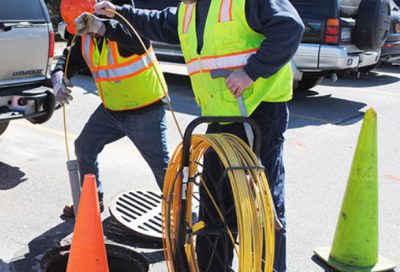If you’re working on a project that requires digging and excavation work, one of the things that will most probably come into your mind is the possibility of coming across utilities that are buried underground. While it is okay to utilize the free “call before you dig” service offered by public utility providers, there is one major aspect of the project that should be performed as well – and that is private utility locating.
What is Private Utility Locating?
Private utility locating refers to the process of locating and marking public and privately owned and maintained lines, subsurface facilities and structures. Septic tanks and lines, underground tunnels, sprinkler systems, unmarked underground graves, and underground wiring of detached garages are some of the things an able private utility locating service like the private utility specialists locate, identify and mark. These are called private utilities because they don’t belong to public utility companies like telephone service providers, electric companies, or water-distribution establishments.
What’s the Major Difference Between Public and Private Utilities?
Public utilities are owned and maintained by public utility companies, and they are intended to provide service to a community or locality.
Private utilities, on the other hand, are utilities that are not owned or maintained by public utility companies. These can include lines coming from substations, refineries and industrial facilities. These utilities are maintained by entities or companies that own them and they don’t belong to the jurisdiction of companies offering public utility locating services.
Is there a Job Public Utility Locators Cannot Do that Private Utility Locators Can?
Private utilities are beyond the scope and jurisdiction of public utility locating companies. Besides, maps and drawings of private utilities, if available, may not be reliable. Therefore, only private utility locating companies like the utility specialists that have the authority and capability to locate private utilities – and you must use them to ensure a safe digging operation in areas where private utilities may be installed.
The “call before you dig” policy is a very useful step to ensure a safe ground work. But you must not ignore the importance of private utility locations, especially if your digging project involves sensitive locations including police stations, parking lots, hospitals and industrial areas.
What Could Possibly Happen if a Private Utility is Hit?
If you don’t bother to locate private utilities before doing a digging project, you are actually exposing your team to the risk of getting injured or killed when underground utilities are hit. Private utility location is after all not just a protocol but a matter of safety. It prevents many undesirable things from happening such as accidents that can cause injuries or even death, damage to utility lines and possible disruption of a company’s operations, and damage to excavating equipment. All of these translate to unnecessary costs, time lost and possible legal obligations.
When is the Need to Call the Public?
Although more than 30% of homeowners prefer not to call 811 before digging, the federal 811 “call before you dig” phone service is actually available to any property owner who wants to avail themselves of public utility locating services. As a project or property owner, this should always be your first step before you start digging. This is especially necessary if your excavation touches a public part of a utility service before they enter the structures standing on the property. Since public utilities can be installed on private property, you must always call 811 before digging.
When is the Need to Call Private?
Even if you have called 811, you still need to perform private utility locating to ensure accurate locating, identification, marking and mapping of public and private utility lines in the area. While public utility locators can provide you with a general idea of the location of public utility lines, their records can be inaccurate, outdated or missing. It is also possible that the public utility companies notified by 811 can’t reach the site on time to mark their utility lines to allow excavation to begin. It can be a total waste of time.
If you’re sure that the records and maps of public utility lines in your work site are up-to-date and accurate, and no private utilities are installed in the area, the service of a public utility locator should be good enough. But if you can’t be sure about the presence and location of public and private utilities underground, commencing a dig project without the guidance of a private utility locator can be catastrophic.
You must use a private utility locator like the private utility locating Colorado experts to locate unmarked public and private utility lines for you. It can certainly help to spare you from incurring unwanted losses for hitting underground utility lines.






